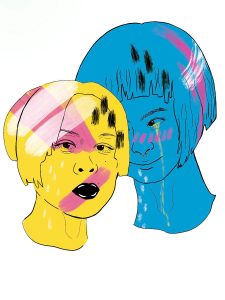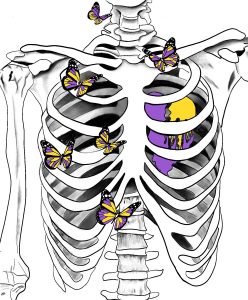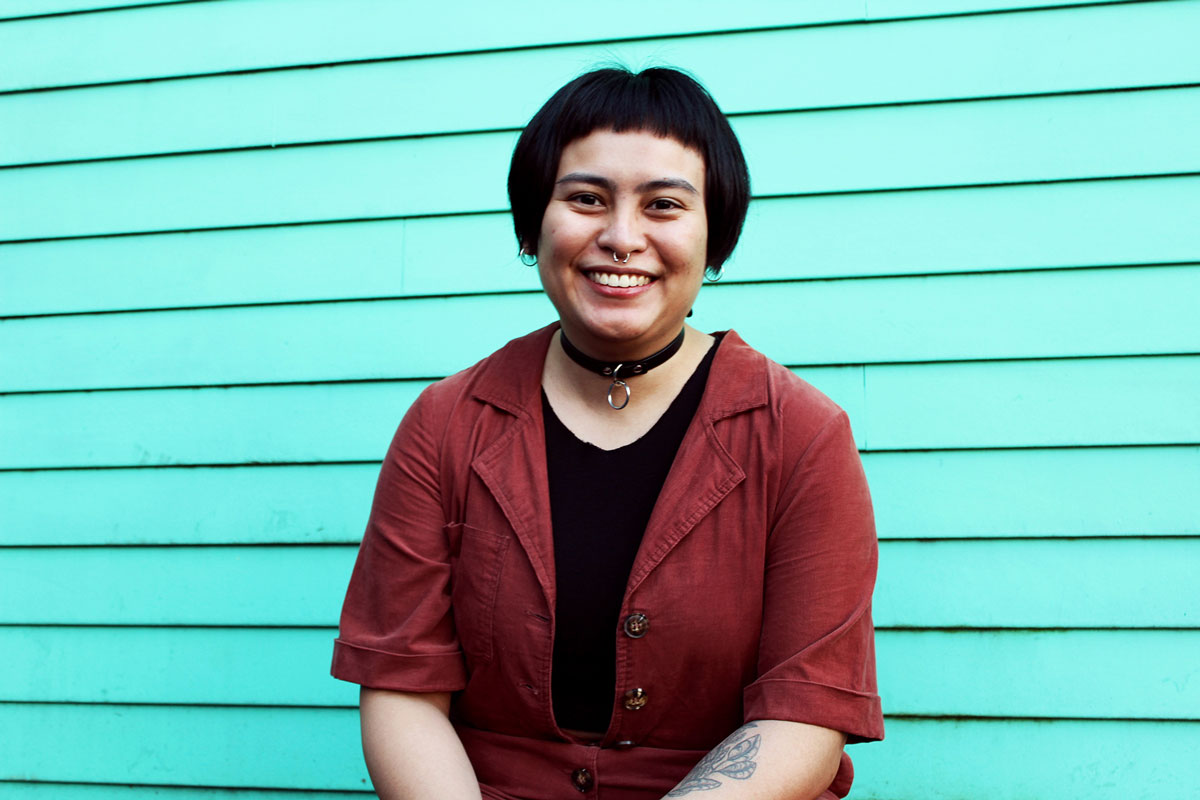Tin Lorica’s debut chapbook, soft armour, makes you want to crawl into bed with your twenty-something memories and stay a while. As Tin’s literary debut, their chapbook is a collage of landmarked moments and poems pinned from the most formative moments of their life. Like moving to Vancouver from Calgary — or dating white people.
Milena: This chapbook is your literary, “in pages” debut. What are you looking to discover within it?
Tin: I didn’t plan to write a whole manuscript, but I have always felt that a poetry chapbook for me was already in the works anyways — so I am thankful that Mallory Tater from Rahila’s Ghost Press was stoked to help me create my first one. I feel like I’m kind of shy in terms of being out there with my poetry — more so than comedy — probably because of the crude things I say on stage sometimes. It’s a side of me that I’m not always readily available to express to just anyone, hence the title of the chapbook, soft armour.
Basically, a lot of the poems in the chapbook are from a lot of experiences that I went through in my early years of moving to Vancouver. And the book is kind of a landmark of moments in my life. Like the first time I dated a white person, or the moment I realized I was (naively) wanting to date another person of colour so I could see something about myself, and how I saw things so black and white back then. It’s me from the ages of like, 21 to 25. Living on my own for the first time, coming into myself.
M: Do you feel like you’ve matured?
Tin: Totally. *laughs* I mean, I think I could have gone to therapy more. But I feel like I’ve matured a lot, for sure.
In chapbook fashion, soft armour is short enough to be read in one sitting, and takes you through a sequence of moments soft enough to laugh at and heavy enough to remember. There’s a quiet sense of acceptance that anchors the conversation — it is the kind of comfort you collect on your walk around the sun.
Tin: The first half of the poems are very silly and kind of jokey. I don’t get vulnerable until halfway through. So yeah, even in the way that I sequenced it, it kind of has this armour already. I don’t know… I feel like you just get kind of closer and closer into like, my emotional core, or whatever. I mentioned my mom a lot in it. Apparently that’s a very Cancer thing — because I’m a Cancer moon, and a Cancer Mars. I don’t know if you’re into astrology at all, but I’m also not an expert.

M: Does astrology play as big a part in the book as in your life?
Tin: Yeah. Well, I’m also an Aries sun, but I have a lot of water in my chart. That’s where the soft part comes from. And yeah, Cancer placements specifically are supposed to have a kind of weird karmic relationship to The Mother. It doesn’t necessarily mean [your literal] mother, it’s kind of like, mothering generally. Something like that. I went through the manuscript recently, and l say the word “mother” like 10 times, and I think I’m exaggerating a little bit, but yeah. I also don’t want my mom to read it.
M: Did you go through writer’s block? Or artist’s block?
Tin: I’m going through that now, for sure. I just let it happen. I like to just pour myself into something else. I picked up a lot of hobbies during COVID. I was like, Okay, I’m just not gonna try to write anything. I’m not gonna try to be funny. I’m just not going to do anything creative. I’m just letting myself [feel ok with] being creatively blocked.
M: I know you said that you were taking a break from making people laugh, but a large part of what you usually do is making people laugh, and I was curious how this translates into the book and into your poetry.
Tin: My friend, Jackie Hoffart, who runs New Moon Comedy, […] helped me out a little bit with writing my bio, a task I always dread. [In] one of them she basically describes me as a poetic comedian, and comedic poet. I just feel like they kind of go really well with each other. It would drive me crazy if I was around someone who was just trying to make people laugh all the time. Because I definitely use it as a defense mechanism. I definitely inject humor in the poems.
M: You’ve said that the two practices [poetry and standup] foil each other. They enhance one another, but there seems to be a difference in vulnerability between the two — at least for you. How do you work with that?
Tin: I wrote and filmed my first sketch very recently — it was really terrifying because it was a solo sketch. And I have to look at the camera and put on this character and voice. I have never acted in anything before and it was so, so vulnerable — it took me like five takes. I kept glaring at the camera. It was like I was trying to familiarize myself with it, like it was a stranger I was struggling to befriend. I was highly suspicious — like what if it steals my soul? I’m pretty monotonous when I deliver standup, so to put on a character and act was definitely another kind of vulnerability that I haven’t experienced as a performer.
Art has always been a way of exposing your inner world to people, which I am always learning to be okay with, and not spiral after expressing myself. I’ll look at the chapbook one day ,and like, flip through it and be really embarrassed about something that I wrote, that I decided to share with the world. I just really have to let go and be okay with that process. Yeah, that’s definitely one thing I learned, to let go and embarrass myself.

Tin and I laugh over the “light roasting” that we’ve experienced living in filipino and latino households. It’s true, we roast and then toast at family dinners, feeling somewhat closer than before. Culturally, astrologically, comically, poetically and wonderfully funny.
When I was 10, I started to question my dad’s taste in music. He is an earnest Beatles fan, and every Sunday he would just blast the Beatles. One day I asked him why he liked this ‘hippie music’ and my mom thought it was the funniest thing. This inquisitiveness would later escalate to me imitating the way he scratched his balls while watching TV to my entire family. Everyone loved it. In a way my mom bolstered my comedy career, by giving me the license to roast my father.
Earlier I was saying that I treated humour as a kind of defense mechanism — it’s also like a really great way to catch people off guard, and lets them know that me joking with them is me trying to be intimate with them. It’s a way to bring people in.
M: Do you want people to read your book all in one sitting? Or do you think it matters where they start?
T: It’s totally up to the reader, but I know that sometimes when I read a poetry collection and something really clicks, I have to see the whole thing through. I would be happy if some weirdo out there decided they needed more of my voice and read the whole thing, but I wouldn’t force anyone to do so. It’s always shocking to me that people can relate to me. It’s always an honor. When people connect with my poetry, when they come up to me [after a reading] and tell me, “I really resonated with that,” I really, really, appreciate it.
The chapbook covers a lot of things like, diasporic anxiety, dating white people anxiety, understanding my baby queer self in relation to other queer people anxiety. soft armour is definitely a coming of age.


